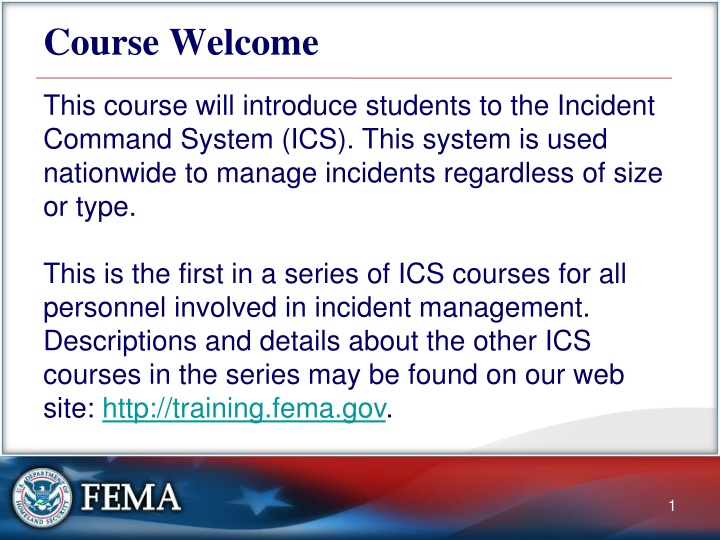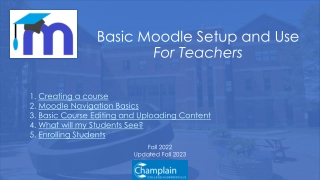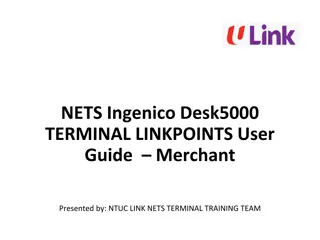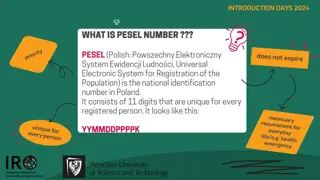
Introduction to Incident Command System (ICS) Training Course
"Join our comprehensive Incident Command System (ICS) training course to learn the principles, structure, and roles within ICS. Get prepared to effectively manage incidents and coordinate with response partners at all levels. Start your journey towards mastering incident management today!"
Download Presentation

Please find below an Image/Link to download the presentation.
The content on the website is provided AS IS for your information and personal use only. It may not be sold, licensed, or shared on other websites without obtaining consent from the author. If you encounter any issues during the download, it is possible that the publisher has removed the file from their server.
You are allowed to download the files provided on this website for personal or commercial use, subject to the condition that they are used lawfully. All files are the property of their respective owners.
The content on the website is provided AS IS for your information and personal use only. It may not be sold, licensed, or shared on other websites without obtaining consent from the author.
E N D
Presentation Transcript
Course Welcome This course will introduce students to the Incident Command System (ICS). This system is used nationwide to manage incidents regardless of size or type. This is the first in a series of ICS courses for all personnel involved in incident management. Descriptions and details about the other ICS courses in the series may be found on our web site: http://training.fema.gov. 1
Course Goal The overall course goal is to promote effective response by: Familiarizing you with the Incident Command System (ICS) and the NIMS principles used to manage incidents. Preparing you to coordinate with response partners from all levels of government and the private sector. IS-100.c provides information on ICS which is part of the National Incident Management System (NIMS). To learn more about NIMS following completion of this course, you can take IS-700.b: An Introduction to the National Incident Management System. 2
Overall Course Objectives At the completion of this course, you should be able to: Explain the principles and basic structure of the Incident Command System (ICS). Describe the NIMS management characteristics that are the foundation of the ICS. Describe the ICS functional areas and the roles of the Incident Commander and Command Staff. Describe the General Staff roles within ICS. Identify how NIMS management characteristics apply to ICS for a variety of roles and discipline areas. 3
Student Introductions Introduce yourself by providing: Your name Your job title A brief statement of your overall experience with emergency or incident response Your possible roles in responding to incidents 4
Student Expectations What do you expect to gain from this course? 5
Course Structure The course is divided into the following five units: Unit 1: Course Welcome and ICS Overview Unit 2: NIMS Management Characteristics Unit 3: ICS Functional Areas and Command Staff Roles Unit 4: General Staff Roles Unit 5: How ICS Applies to You 6
Course Logistics Review the following information: Course agenda Sign-in sheet Breaks Message and telephone location Cell phone policy Facilities Other concerns 7
Sample Agenda Morning Session Unit 1: Course Welcome and ICS Overview (1 hours) Unit 2: NIMS Management Characteristics (1.5 hours) Unit 3: ICS Functional Areas and Command Staff Roles (1 hour) Afternoon Session Unit 4: General Staff Roles (1 hour) Unit 5: How ICS Applies to You (1 hour) Final Exam (1 hour) 8
Course Completion In order to successfully complete this course, you must: Participate in unit activities. Achieve 75% or higher on the final exam. Complete the end-of-course evaluation. 9
Unit 1: ICS Overview Unit 1 provides an overview of the Incident Command System (ICS). At the end of this lesson, you should be able to: Describe the Whole Community approach to ICS. Identify the basic concept and benefits of ICS. 10
Whole Community Every part of society must be involved in preparing for, protecting against, responding to, recovering from, and mitigating any and all incidents. The Federal Government is only one part of the whole community. The Whole Community approach ensures solutions that serve the entire community are implemented, while simultaneously making sure that the resources the different members of the community bring to the table are used efficiently. These members include those in all levels of government as well as those in non-governmental and private-sector organizations in fields such as transportation, health care, schools, public works, communications, agriculture, chemical/nuclear, and more. 11
What is the Incident Command System? The Incident Command System (ICS) is a standardized approach to incident management that: Is used for all kinds of incidents by all types of organizations and at all levels of government; ICS is applicable to small incidents as well as large and complex ones. Can be used not only for emergencies, but also for planned events. Enables a coordinated response among various jurisdictions and agencies. Establishes common processes for incident-level planning and resource management. Allows for the integration of resources (such as facilities, equipment, personnel) within a common organizational structure. 12
When is ICS Used? The Incident Command System (ICS) can be used to manage any type of incident, including a planned event (e.g., the Olympics, the Governor's inauguration, state fairs, a local parade, etc.). The use of ICS is applicable to all types of incidents, regardless of their size or cause. As a system, ICS is extremely useful. Not only does it provide an organizational structure for incident management, but it also guides the process for planning, building, and adapting that structure. Using ICS for every incident or planned event provides the practice that will help to maintain and improve skills needed to effectively coordinate larger or more complex efforts. 13
ICS for Planned Events From your own experiences, what are some examples of different types of planned events where ICS was used? Why was it beneficial to use ICS? 14
Incident Command System: Promoting Response Partnerships 15
ICS as a Component of the National Incident Management System (NIMS) The National Incident Management System (NIMS) is a systematic, proactive approach to guide all levels of government, nongovernmental organizations (NGOs), and the private sector to work together to prevent, protect against, mitigate, respond to, and recover from the effects of incidents. NIMS provides a consistent foundation for all incidents, ranging from daily occurrences to incidents requiring a coordinated Federal response. NIMS is organized into three major components: Resource Management Command and Coordination - including the Incident Command System Communications and Information Management It is important to note that the Incident Command System (ICS) is just one part of NIMS. 16
Incident Response Problems What are some common causes of incident response problems? 17
ICS Benefits - Student Activity Activity Purpose: The purpose of this activity is to discuss the benefits of ICS. Instructions: Follow the steps below to conduct this activity: 1. Divide into groups of five or six. 2. Work as a team to review the scenario presented below. 3. Identify the top three challenges for officials to manage this incident. 4. Write the challenges on chart paper. 5. Discuss how ICS could be used to address these challenges. 6. Select a spokesperson. Time: 20 minutes (including debrief) Scenario: Continuing severe weather is causing widespread damage. There are multiple impacts in the community. Vehicle movement is constrained, some people are stranded and are in need of assistance, there have been impacts on communications and power, and some structures are impacted. 9-1-1 operators are receiving conflicting reports about a number of life-safety needs, including some weather-related injuries and an unverified report of the structural collapse of an assisted living facility. 18
Benefits of ICS The Incident Command System (ICS) has positively impacted incident management efforts by: Clarifying chain of command and supervision responsibilities to improve accountability. Leveraging interoperable communications systems and plain language to improve communications. Providing an orderly, systematic planning process. Implementing a common, flexible, predesigned management structure. Fostering cooperation between diverse disciplines and agencies. 19
ICS: Built on Best Practices The Incident Command System (ICS) has been tested for more than 40 years of emergency and nonemergency applications by all levels of government; and in nongovernmental and private-sector organizations. ICS helps to ensure: The safety of responders, community members, and others. The achievement of incident objectives. The efficient use of resources. 20
Review Questions Let's review what you have learned in this Unit: What is a basic definition of the Incident Command System? Is it the same as NIMS? What are some situations for which it can be used? 21
Unit 1 Summary You have completed the Course Welcome and Incident Command System (ICS) Overview unit. This unit presented the following key points: ICS is a standardized management tool that allows better coordination and use of resources. ICS represents organizational best practices and has become the standard for emergency management. ICS can be used to manage the response for all incidents and planned events. ICS works! It saves lives! 22






















